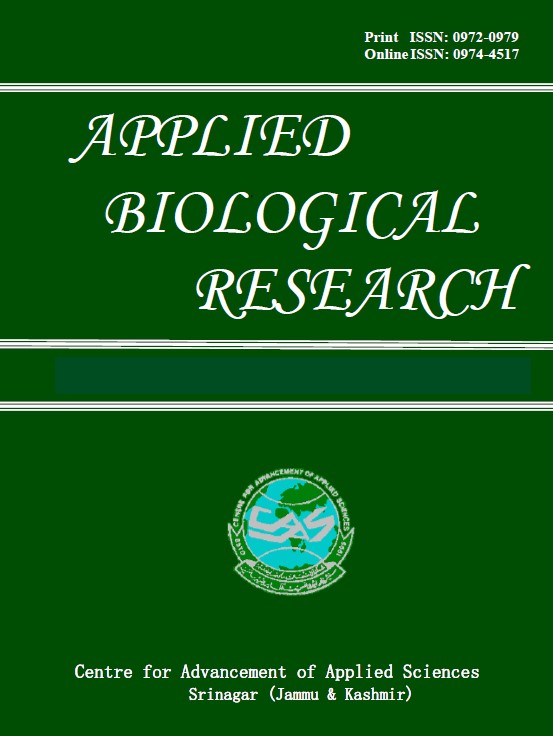Association Analysis And Selection Strategies For Various Yield Contributing Traits In Rice Genotypes
DOI:
https://doi.org/10.48165/Keywords:
Correlation analysis, genetic variability, path analysis, riceAbstract
Genetic differences between rice genotypes were analyzed to assess genetic association between grain yield and yield contributing traits as a basis for selection of high yielding rice genotypes. Forty-two rice genotypes were evaluated for 11 quantitative traits to decide selection criteria under sandy loam soil conditions at Northern Hill Zone of Chhattisgarh (India). Results revealed enough variability in genotypes. Genotypic coefficient of variation was highest in grains panicle-1 (22.02), followed by spikelet fertility (18.30), spikelets panicle-1 (17.11), yield (15.395 kg ha-1). High estimates for heritability was exhibited by spikelet fertility (99.84) followed by days to 50% flowering (98.39), days to maturity (95.75), plant height (79.08). The number of grains panicle-1 showed highest positive direct effect (4.88) on grain yield followed by plant height (0.476), spikelet fertility (0.29) and days to 50% flowering (0.21). The characters showing high heritability coupled with high genetic advance and significant correlation with yield contributing traits may be used as selection criteria for grain yield under sandy loam soil conditions.
Downloads
References
Al-Jibouri, H.A., Millar, P.A. and Robinson, H.F. 1958. Genotypic and environmental variances and covariances in an upland cotton cross of interspecific origin. Agronomy Journal, 50: 632-636. Asia Rice Foundation. 2004. Last update September 23, 2004, http://www.asiarice.org/sections/ science.html.
Borkakati R.P., Chowdhari, R.K. and Kurmi, K. 2005. Studies on genetic variability and correlation in some rice hybrids. National Journal of Plant Improvement, 7: 119-121.
Burton, G.W. and Vane De, E.H. 1953. Estimating heritability in tall fescue (Festucaarun dinaceae) from replicated clonal material. Agronomy Journal, 54: 478-481.
Dewey, D.R. and Lu, K.H. 1959. A correlation and path analysis of components of crested wheat grass seed production. Agronomy Journal, 51: 515-518.
Dhanwani, R.K., Tiwari, J.K. and Sarawgi, A.K. 2013. Correlation and path coefficient analysis for yield and quality traits in rice. Journal of Interacadmicia, 17: 604-613.
Dou, F., Soriano, J., Tabien, R.E., Chen, K. 2016. Soil texture and cultivar effects on rice (Oryza sativa, L.) grain yield, yield components and water productivity in three water regimes. PLoS ONE, 11(3): e0150549.doi:10.1371/journal.pone.0150549.
Jayasudha, S. and Sharma, D. 2010. Genetic parameters of variability, correlation and path coefficient for grain yield and physiological traits in rice (Oryza sativa L.) under shallow lowland situation. Electronic Journal of Plant Breeding, 1(5): 33-38.
Johnson, H.W., Robinson, H.F. and Comstock, R.E. 1955. Genotypic and phenotypic correlations in soybean and their implications in selection. Agronomy Journal, 47(7): 314-318. Khush, G.S. 1997. Origin, dispersal, cultivation and variation of rice. Plant Molecular Biology, 35: 25-34.
Oad, F.C., Samo, M.A., Hassan, Z.U., Pompe, S.C. and Oad, N.L. 2002. Correlation and path analysis of quantitative characters of rice ratoon cultivars and advance lines. International Journal of Agriculture & Biology, 4: 204-207.
Padmaja, D., Radhika, K., Subba Rao, L.V. and Padma V. 2011. Correlation and path analysis in rice germplasm. Oryza, 48: 67-72.
Panse, V.G. 1957. Genetics of quantitative characters in relation to plant breeding. Indian Journal of Genetics and Plant Breeding, 17: 318-328.
Patil and Sarawgi A.K. 2005. Studies on genetic variability, correlation and path analysis in traditional aromatic rice accessions. Annals of Plant Physiology, 19: 92-95. Poehlman,J.M. andSleper,D.A. 1995. Breeding Field Crops (4thedn.). Iowa State Press, Iowa, USA. Powers, R.F., Scott, D.A., Sanchez, F.G., Voldseth, R.A., Page-Dumroese, D., Elioff, J.D. and Stone, D.M. 2005. The North American long-term soil productivity experiment, Findings from the first decade of research. Forest Ecology Management, 220: 31-50.
Priya, A.A. and Joel, A.J. 2009. Grain yield response of rice cultivars under upland condition, Electronic Journal of Plant Breeding, 1: 6-11.
Six, J., Paustian, K., Elloitt, E.T. and Combrink, C. 2000. Soil structure and soil organic matter, I. distribution of aggregate size classes and aggregate associated carbon. Soil Science Society of America Journal, 64: 681-689.
Singh, R.K. and Chaudhary, B.D. 1985. Biometrical Methods in Quantitative Genetic Analysis. Kalyani Publishers, New Delhi, India.
Tiwari, J.K., Rastogi, N.K., Chandrakar, P.K., Sarawgi, A.K. and Verulkar, S.B. 2013. Identification of four rice varieties from Chhattisgarh through DUS characterization. Indian Journal Plant Genetic Resources, 26: 238-240.

